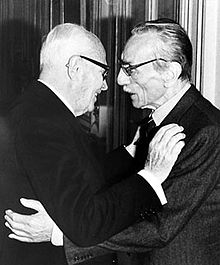Eduardo De Filippo

Eduardo De Filippo (* 24. May 1900 in Naples , † 31 October 1984 in Rome ) was an Italian actor and playwright . He was also active as a screenwriter and film director.
Life
De Filippo was born on May 24, 1900 in Naples. His first stage appearance was in 1904 as a Japanese child in the operetta "La Gheisha". He began to regularly visit the theater company of his biological father Eduardo Scarpetta . From 1914 to 1921 he was a member of Vincenzo Scarpetta's troupe.
In 1921 he wrote his first one-act play, "Farmacia di turno". He became a member of the Peppino Villani theater company . Eduardo Scarpetta died in 1925 without having recognized his three illegitimate children as his. De Filippo married the American actress Dorothy Pennington in 1928 , and the marriage lasted only a few months. In the summer of 1929, together with his brother Peppino and his sister Titina, in vaudeville style, he performed a review of Kokasse and Tricot (pseudonyms for Mario Mangini and Eduardo) in front of the Molinari group. His one-act play “Sik-Sik, l'artefice magico” led him to his first great success as a playwright.
In 1931 he founded the "Teatro Umoristico i De Filippo" with his brother and sister. Pirandello , impressed by the self-defeat of the “De Filippo” troupe, wanted to bring his “Liolà” to the stage in 1932 in a Neapolitan version. The “De Filippo” troupe then brought “Liolà” to the stage in 1934. After the success of “Liolà”, Pirandello wanted to show “Il berretto a sonagli” in the Neapolitan language on stage. Eduardo played the role of the main character Ciampa.
In 1937 "L'abito nuovo", written by Eduardo and Pirandello together, based on a short novel by Pirandello, was performed. Titina, who had temporarily left the “De Filippo” troop to work for a troop of Nino Taranto , rejoined her brothers in 1941. Peppino De Filippo left the troupe in 1944 and thus caused it to be disbanded. In 1945 Eduardo De Filippo founded the troupe "Il teatro di Eduardo" together with Titina. In March, “Napoli milionaria” premiered at the San Carlo Theater, Naples. From then on, the troupe performed both in Italy and abroad.
From 1932 De Filippo was also active as a film actor; Since 1939 he has also directed films, which were often made from his own plays. Almost all films had in common that they settled in the milieu of poor people and aimed at sentiment and melodrama with also comedic means.
In 1972 De Filippo was awarded the international Antonio Feltrinelli Prize . In 1981 he was appointed Senator for Life.
De Filippo was married three times; with Dorothy Pennington , Thea Prandi and after their death with Isabella Quarantotti .
Filmography (selection)
actor
- 1945: To new life (La vita ricomincia)
- 1947: The Drawn (Assunta Spina) (& book)
- 1951: The girls from Spanish Square (Le ragazze di piazza di Spagna)
- 1952: A car doesn't make a millionaire (Cinque poveri in automobile) (& book)
- 1953: The Beloved (Traviata 53)
- 1953: Roman dance (Villa Borghese)
- 1953: Tempi nostri (Tempi nostri) (& book)
- 1954: The Gold of Naples (L'oro di Napoli)
- 1955: Two silver candlesticks (Il cortile)
- 1958: The man in the shorts (L'uomo dai calzoni corti)
- 1958: Storm over Eden (Raw wind in Eden)
- 1960: Ferdinand - King of Naples (Ferdinando I, re di Napoli)
- 1961: The haunted castle in Via Veneto (Fantasmi a Roma)
- 1960: The way back (Tutti a casa)
- 1963: Yesterday, today and tomorrow (Ieri, oggi, domani) (& book)
Also as a director
- 1950: Metropolis of Naples (Napoli milionaria) (& book)
- 1952: Girls for marriage (Ragazze da marito) (& book)
- 1952: The Seven Sins (Les sept péchés capitaux) (& book) (one episode)
- 1957: Fortunella (Fortunella) (& book)
As a screenwriter
- 1954: Love, Bread and Jealousy (Pane, amore e gelosia)
- 1964: Wedding in Italian ( Matrimonio all'italiana )
Web links
- Literature by and about Eduardo De Filippo in the catalog of the German National Library
- Eduardo De Filippo in the Internet Movie Database (English)
Individual evidence
- ^ Roberto Poppi: Dizionario del cinema italiano, I registi, Gremese 2002, p. 140
| personal data | |
|---|---|
| SURNAME | De Filippo, Eduardo |
| BRIEF DESCRIPTION | Italian actor and playwright and film director |
| DATE OF BIRTH | May 24, 1900 |
| PLACE OF BIRTH | Naples |
| DATE OF DEATH | October 31, 1984 |
| Place of death | Rome |